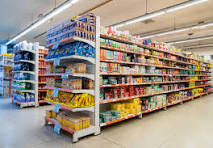Description
A supermarket is a large retail establishment that offers a wide variety of products under one roof. These products typically include food items, beverages, household essentials, personal care products, and sometimes clothing and electronics.
Supermarkets are characterized by their self-service model, where customers can browse shelves, select items, and pay for them at designated checkout counters. This retail format provides convenience, variety, and often competitive pricing, making it a popular shopping choice for households and individuals.
In Nigeria, supermarkets are growing in prominence as urbanization increases and consumers seek a more organized and convenient shopping experience compared to traditional open markets or small corner shops.
Supermarkets come in various forms, catering to different consumer needs and preferences. Some of the common types include:
Hypermarkets: These are large-scale supermarkets that combine grocery shopping with other retail categories, such as clothing, electronics, and furniture. Examples include Shoprite.
Discount Supermarkets: These focus on offering products at lower prices, often through bulk purchasing and streamlined operations. Examples include markets with private-label brands.
Convenience Supermarkets: These are smaller, localized supermarkets that provide basic grocery and household items, focusing on accessibility and quick shopping experiences.
Specialty Supermarkets: These cater to specific niches, such as organic foods, health products, or imported goods.
Online Supermarkets: Emerging as a modern trend, these allow customers to order groceries online and have them delivered to their doorstep. Platforms like Jumia Fresh have entered this space in Nigeria.
Nigeria’s supermarket landscape is dominated by both local and international brands. Some of the top supermarkets include:
Shoprite: A South African chain with multiple outlets across major cities in Nigeria, offering a wide variety of products.
Spar: Known for its international standards, Spar operates in key urban centers and provides groceries, electronics, and lifestyle items.
Justrite: A homegrown brand that caters to middle-income families with affordable pricing.
Prince Ebeano Supermarket: This upscale supermarket chain serves affluent areas in Lagos and Abuja.
Addide: A local chain of smaller supermarkets focusing on convenience and affordability.
The Nigerian food & grocery retail market had total revenues of $52.3 billion in 2022, representing a compound annual growth rate (CAGR) of eight point one percent (8.1%) between 2017 and 2022, with over seven thousand (7,000) supermarkets and grocery stores spread across the country.
The Nigerian supermarket sector has experienced steady growth over the past decade, fueled by urbanization, a rising middle class, and increasing consumer spending. According to industry reports:
The country’s urban population, which exceeds fifty percent (50%) of the total population, drives the demand for organized retail formats like supermarkets.
Lagos, Abuja, and Port Harcourt are key cities with high supermarket penetration due to their dense populations and economic activities.
The growth of e-commerce in Nigeria has also boosted the reach of supermarkets, with many adopting online platforms to complement their physical stores.
Despite these positive indicators, the market remains under-penetrated compared to developed economies, presenting ample opportunities for growth and investment.
Several trends are shaping the supermarket industry in Nigeria:
E-Commerce Integration: Many supermarkets now offer online shopping options to meet the demands of tech-savvy consumers. This trend gained momentum during the COVID-19 pandemic and continues to grow.
Private Label Products: Supermarkets are introducing private-label brands to provide affordable alternatives to popular products, thereby increasing profit margins.
Expansion to Secondary Cities: To tap into new markets, supermarkets are opening outlets in smaller cities and towns, beyond traditional urban centers.
Focus on Fresh Produce: The demand for fresh, organic, and locally sourced produce has increased, prompting supermarkets to dedicate significant shelf space to these items.
Loyalty Programs: To retain customers, many supermarkets are adopting loyalty programs that offer discounts, points, and rewards.
Sustainability Initiatives: Environmentally conscious practices, such as reducing plastic use and promoting reusable bags, are becoming more common in top supermarkets.
While the opportunities are significant, the supermarket industry in Nigeria faces several challenges:
High Operating Costs: The costs of rent, utilities, and logistics are among the highest in sub-Saharan Africa, affecting profit margins.
Supply Chain Inefficiencies: Poor infrastructure and inconsistent supplier reliability often lead to stockouts or increased costs for transportation and inventory.
Economic Instability: Inflation, currency fluctuations, and low consumer purchasing power can impact sales and profitability.
Competition with Informal Markets: Traditional open markets and small shops remain a dominant retail channel due to their familiarity and often lower prices.
Security Concerns: Ensuring the safety of customers and goods, particularly in high-risk areas, adds to operational complexities.
Limited Skilled Workforce: Recruiting and retaining skilled staff for specialized roles, such as inventory management, can be challenging.
Despite these challenges, the prospects for the supermarket industry in Nigeria are bright. Key drivers of future growth include:
Demographic Dividend: With a population exceeding two hundred million (200,000,000) and a median age of eighteen (18), Nigeria offers a large, youthful market that will drive consumption for decades.
Urbanization: As more people move to cities, the demand for organized retail formats will increase.
Economic Diversification: Efforts to diversify Nigeria’s economy away from oil dependency will likely lead to increased consumer spending and retail growth.
Technological Advancements: Mobile payment systems, e-commerce platforms, and customer analytics tools provide opportunities for innovation and improved customer experiences.
Foreign Investment: The entry of international retail brands and investors can bring global best practices and enhance the sector’s competitiveness.
Customer-Centric Innovations: Supermarkets that focus on convenience, affordability, and a seamless shopping experience will be well-positioned to succeed.
The supermarket business in Nigeria is a promising venture, with ample opportunities for growth and profitability. While challenges such as high operating costs and supply chain inefficiencies exist, these can be mitigated through strategic planning, technological adoption, and customer-centric approaches. By leveraging the growing demand for organized retail, businesses can tap into Nigeria’s expanding market and contribute to the country’s economic development.
Entrepreneurs and investors entering this sector should focus on understanding consumer preferences, optimizing operations, and building strong brand loyalty to achieve long-term success.

Reviews
There are no reviews yet.